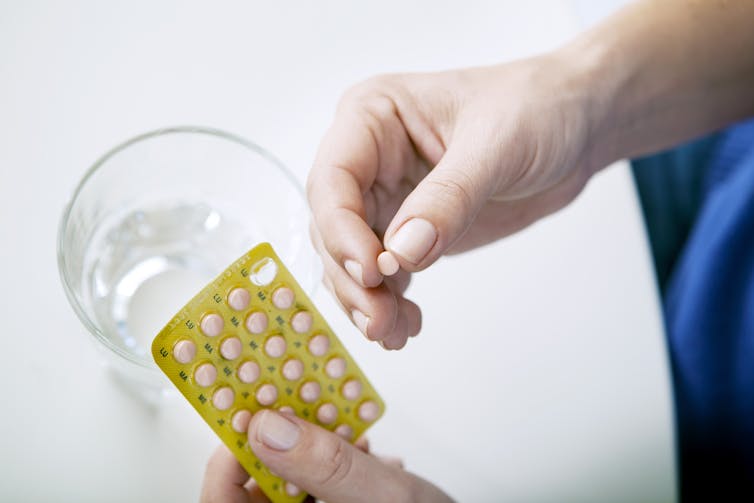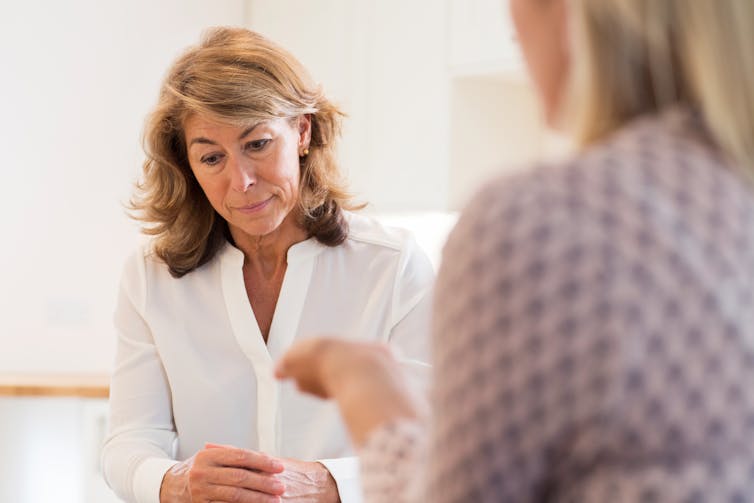We don't know menopausal hormone therapy causes breast cancer, but the evidence continues to suggest a link
- Written by Martha Hickey, Professor of Obstetrics and Gynaecology, University of Melbourne
Menopause is a normal life stage for women at around 51 years. Most women don’t need treatment for their symptoms, but around 13% of Australian women aged 50-69 take menopausal hormone therapy (sometimes called “hormone replacement therapy”).
This medication contains hormones that are normally low or absent after menopause, and reduces symptoms such as hot flushes and night sweats, which can be troublesome and persistent for some women.
But growing evidence over recent years has pointed to an increased risk of breast cancer associated with menopausal hormone therapy. This has already led some women to stop or avoid the treatment.
Now a new study, published in the leading medical journal The Lancet, strengthens the existing evidence, and suggests the risks are greater than we previously thought.
Read more: Here's what you need to know about menopausal hormone therapy and cancer risk
This study only measured the risk of breast cancer, not potential benefits such as improved symptoms, sleep and quality of life.
However, it provides important information to help women decide whether to take menopausal hormone therapy and how long for.
What the study found
This paper combined data from 58 international studies conducted between 1992 and 2018 to measure the association between menopausal hormone therapy and breast cancer. Cumulatively, the studies included more than 100,000 women with breast cancer and 400,000 women without breast cancer.
The authors found women taking any type of menopausal hormone therapy, except topical (vaginal) oestrogen, had a higher risk of breast cancer compared with women of a similar age who did not take menopausal hormone therapy, taking into account other known risk factors for breast cancer.
The increased risk of breast cancer was apparent after only one year on menopausal hormone therapy, and increased steadily with longer duration of use.
 About 13% of Australian women of menopausal age take menopausal hormone therapy.
From shutterstock.com
About 13% of Australian women of menopausal age take menopausal hormone therapy.
From shutterstock.com
Menopausal hormone therapy contains oestrogen to treat the symptoms of menopause, plus progesterone (or a progestogen which acts like progesterone), to prevent endometrial (uterine) cancer. This is called combined menopausal hormone therapy.
Given that progestogen is added to oestrogen to prevent uterine cancer, it’s somewhat ironic that it may increase the risk of breast cancer.
A previous large randomised controlled trial showed more than five years of combined menopausal hormone therapy increased the risk of breast cancer. New data from this study suggest oestrogen alone also increases breast cancer risk, although much less than combined menopausal hormone therapy.
The authors estimated for every 50-70 women taking combined (oestrogen and progestogen) menopausal hormone therapy, there would be one additional case of breast cancer. For oestrogen alone, they predicted one additional case for every 200 women taking menopausal hormone therapy.
The study also found taking progestogen every day in menopausal hormone therapy (called “continuous combined”) may increase breast cancer risk more than taking progestogen on an intermittent, or “cyclical” basis. Cyclical regimens are less popular in Australia because they are more likely to cause bleeding. This study may change practice towards using cyclical rather than daily progestogen.
Read more: Science or Snake Oil: do meds like Remifemin ease hot flushes and night sweats in menopausal women?
The studies included in this review are observational, so while they demonstrate a correlation, they cannot prove menopausal hormone therapy causes breast cancer. However, the associations are strong, there is no other apparent reason for the observed association – and the link is biologically plausible.
Most breast cancers are sensitive to oestrogen and progesterone. We know postmenopausal women with higher circulating levels of oestrogen are at higher risk of breast cancer, and that blocking oestrogen reduces breast cancer risk.
Taking menopausal hormone therapy increases the levels of oestrogen and taking progesterone increases exposure to a hormone not normally produced after menopause.
Length of use
Previously it was thought that up to five years of menopausal hormone therapy did not increase breast cancer risk. This study challenges that assumption by showing risk increased after one year of use. The longer women took menopausal hormone therapy, the greater the risk.
The estimated risk of breast cancer was 6.3% in postmenopausal women who did not take menopausal hormone therapy compared to 8.3% for five years of combined menopausal hormone therapy. This is an absolute increase of 2%, or one extra breast cancer case for every 50 users. That’s approximately twice as high as indicated in earlier studies.
 Uniform national guidelines would assist doctors and patients in deciding the most appropriate way to manage menopausal symptoms.
From shutterstock.com
Uniform national guidelines would assist doctors and patients in deciding the most appropriate way to manage menopausal symptoms.
From shutterstock.com
This new information raises questions about international guidelines, which suggest healthy women around the average age of menopause can safety take menopausal hormone therapy for up to ten years.
Another important finding was the persistent increased risk of breast cancer for up to ten years after stopping menopausal hormone therapy. This is considerably longer than was previously thought.
Read more: Chemical messengers: how hormones change through menopause
Follow-up from another large observational study of over one million women published in the same edition of The Lancet showed menopausal hormone therapy also increases the risk of dying from breast cancer.
In postmenopausal women who had never taken menopausal hormone therapy, one in 135 died from breast cancer, compared with one in 120 women taking oestrogen alone for five years or more, and one in 95 women taking combined menopausal hormone therapy for five years or more.
Together, these findings suggest taking menopausal hormone therapy for more than five years may increase the number of women diagnosed with and dying from breast cancer. Natural or “biodentical” preparations contain similar hormones, and are likely to carry the same risk.
Not the only treatment
While menopausal hormone therapy may be an effective treatment for menopausal symptoms, it’s not the only one. There’s growing evidence drug free and non-hormonal therapies are also effective for hot flushes and night sweats.
For genitourinary symptoms, such as vaginal dryness, topical oestrogen is effective and has shown no increase in breast cancer risk.
Read more: What causes breast cancer in women? What we know, don't know and suspect
Unfortunately, advice and information about the risks and benefits of menopausal hormone therapy have been inconsistent in Australia to date. This makes it more difficult to translate new evidence into safer prescribing and practice, and to guide doctors and patients in deciding whether menopausal hormone therapy is the right choice.
For women going through menopause at the average age, menopausal hormone therapy should only be used to treat troublesome menopausal symptoms, not for the prevention or treatment of other conditions.
Women with troublesome symptoms need high quality information to weigh up the risks and benefits of hormonal therapy.
We urgently need national consensus guidelines, incorporating the most up-to-date evidence, to better support women and their health-care providers to make informed decisions about safe and effective ways to manage menopausal symptoms.
Authors: Martha Hickey, Professor of Obstetrics and Gynaecology, University of Melbourne




